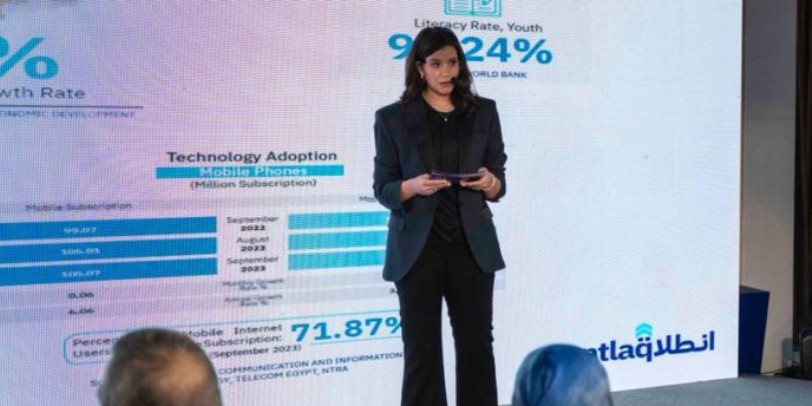Entlaq launches first bi-annual report on Egypt's entrepreneurship sector
The report aims to provide the Egyptian entrepreneurship sector with evidence-based methods that allow greater visibility into the sector, mainly by expanding the sector’s access to data to enhance the decision-making process, creating evidence-based channels to and from entrepreneurs

Entlaq released its first bi-annual Entrepreneurship Sector Diagnostics Report today December 24, shedding light on Egypt's entrepreneurial ecosystem and laying the foundations for a deeper understanding of the challenges and opportunities faced by entrepreneurs, investors and players across the ecosystem.
The launch event was attended by the CEO of the General Authority for Investment and Free Zones (GAFI) Hossam Heiba, Hossam Othman, Advisor to the Minister of Communications and Information Technology, Chairman of the Technological Innovation and Entrepreneurship Center (TIEC) and Executive Vice President of the Information Technology Industry Development Authority, and Board Member at the African Development Bank Group Ahmed Zayed, Founder and CEO of RiseUp, Abdel Hamid Sharara and EG Bank’s Chief Corporate Communication Officer Nelly Mahmoud among other private sector companies and ecosystem players.
"Our strategy stems from our vision to be part of the success of the entrepreneurship ecosystem in Egypt. Our vision allowed us to see that the ecosystem must be based on 3 main elements, which we call the triple I strategy at Entlaq: Innovation, Inclusion and Impact," CEO of Entlaq, Mohamed Ehab Hafez, told Business Today on the sidelines of the launch event of Entlaq's first Entrepreneurship Sector Diagnostics Report.
The report aims to provide the Egyptian entrepreneurship sector with evidence-based methods that allow greater visibility into the sector, mainly by expanding the sector’s access to data to enhance the decision-making process, creating evidence-based channels to and from entrepreneurs, and creating a platform for dialogue between stakeholders in the ecosystem, which contributes to reaching actionable data-driven policies.

In addition, the report, which surveyed more than 70 startups, includes recommendations and key takeaways to accelerate the growth of the Egyptian entrepreneurship sector. The report provides numerical ratings that offer insights across segments, ranging from 0 (very inadequate) to 5 (very adequate). Here are some of the key takeaways from the report:
Policy and Government (2.99):
The report indicates a moderate level of satisfaction with policy and government measures, suggesting room for improvement. It highlights potential gaps or inefficiencies in government policies that impact the overall business environment. Interestingly, the effectiveness of policy and government measures varies significantly across sectors, with Healthcare and Biotechnology receiving the highest rating of 3.59. This underscores the importance of robust government policies, particularly in the context of Egypt, as emphasized by startups in the early stage and larger companies.
Social Inclusion (3.27):
With a score above 3, social inclusion is generally viewed positively within Egypt's entrepreneurial ecosystem. However, the report suggests that there are still areas that need to be addressed to enhance overall inclusivity. Diverse perspectives on social inclusion are influenced by factors such as gender differences, role perspectives, educational backgrounds, and age groups. While females generally rate social inclusion slightly higher, there is a significant divide among different age groups, highlighting the nuanced nature of opinions on this multifaceted issue.
"Through inclusion, we also encompass social inclusion and empowering women in the Egyptian entrepreneurship ecosystem. Only 13% of startups in Egypt have women co-founders. This number needs to increase, the inclusion of women will not only empower them but will also increase Egypt's GDP to reach 34%, according to World Bank figures," Ehab told Business Today.
Financial Accessibility (3.26):
The report indicates a moderately positive perception of financial accessibility among entrepreneurs in Egypt. While there is a sense of adequacy, specific challenges or areas for improvement exist. The accessibility of finances is notably sector-dependent, with the AI and healthcare sectors leading the way with a rating of 3.9. Interestingly, larger startups appreciate financial accessibility more than their medium-sized counterparts, suggesting potential challenges for the latter.
Venture Capital Financing (2.66):
The report reveals a perceived inadequacy in the realm of venture capital financing, as reflected by the lower score. This suggests that businesses in Egypt face challenges in securing sufficient venture capital support, warranting attention and potential reforms. The dynamics of venture capital financing differ across sectors, with the AI (3.5) and healthcare (3.4) sectors receiving positive responses, while software-related sectors encounter challenges. Furthermore, perceptions are influenced by the stages and sizes of firms, with growth-stage firms and large startups expressing dissatisfaction.
Ease of Doing Business (2.90):
The report suggests a moderate view on the ease of doing business in Egypt. Bureaucratic or procedural hurdles may impact the business environment, indicating a need for streamlining processes. Variances in the ease of doing business are evident across sectors and firm sizes. Sectors such as healthcare (3.79) and transportation (3.37) excel in this regard, while software and technology services (2.07) lag behind. Reducing bureaucracy and promoting transparency emerge as crucial factors for fostering a competitive marketplace.





